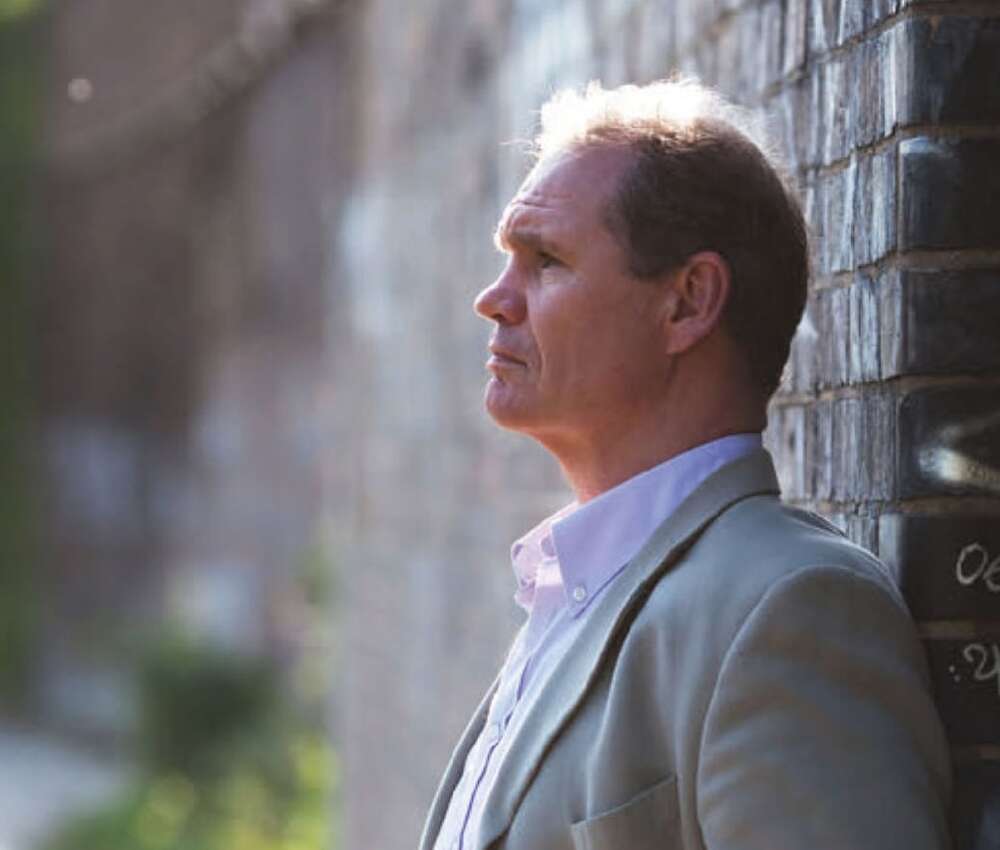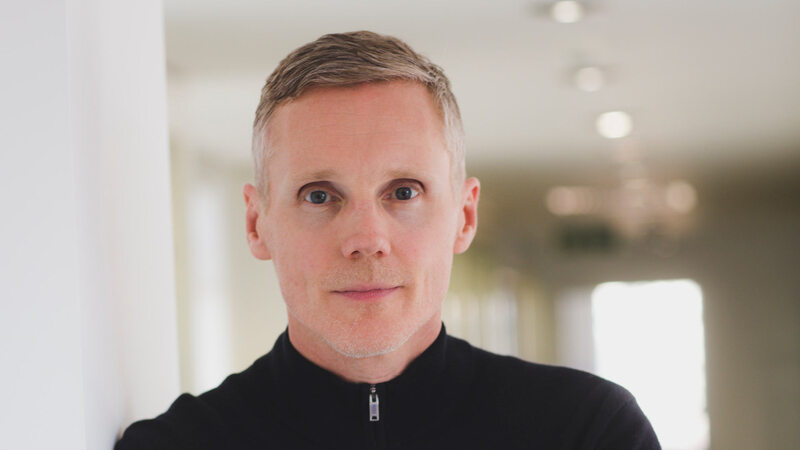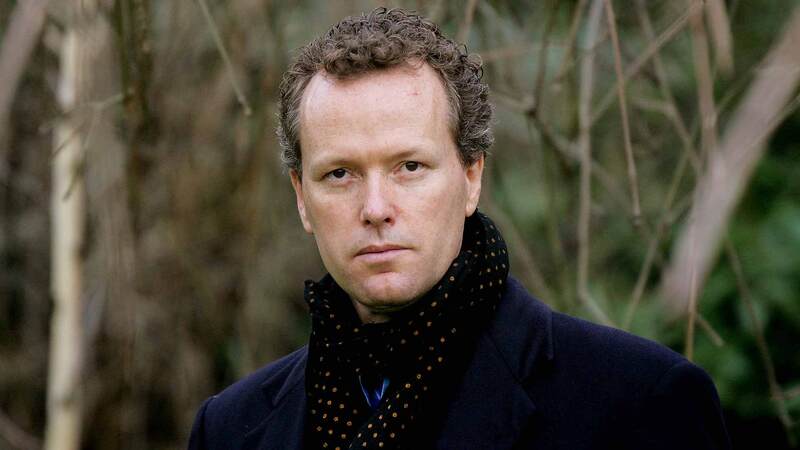You are viewing your 1 free article this month. Login to read more articles.
Erwin James | ' I’m not looking for sympathy, I’m just trying to have my say'

Caroline Sanderson is a non-fiction writer, editor and books journalist. Her books include a travel narrative, A Rambling Fancy: in the F ...more
 Caroline Sanderson
Caroline SandersonCaroline Sanderson is a non-fiction writer, editor and books journalist. Her books include a travel narrative, A Rambling Fancy: in the F ...more
One of Erwin James’ favourite books as a child was Featherbedland, the story of a little boy who lived between the springs of a huge bed, where he was safe and cosy and happy. “I loved imagining how wonderful it would be to live in such a place,” he says. “It was total escapism: the first time I realised you could live another life in a book.”
It was all too brief an escape from a damaging childhood. When he was seven, James’ mother was killed in a road accident. In a heartbreaking passage in his forthcoming book, Reedeemable: A Memoir of Darkness and Hope, James describes how he would repeatedly visit the site of the crash and stare at the light-coloured paving stone that was stained dark with her blood.
Life from then on stains dark too. His father turns to alcohol and violence, while James struggles to find any kind of moral toehold in an existence where only scant love and attention is dispensed by a succession of temporary adults in his life. Profoundly confused, he truants from school and often stays out all night. At the age of 10, he commits his first crime, breaking and entering. The police who pick him up tell him: “You deserve to be killed.”
Through his teens and early twenties he moves from place to place, often living rough. He drinks and brawls and occasionally hooks up with his father—encounters that invariably turn into alcoholic binges. And all the while, his crimes are stacking up: criminal damage, handling stolen goods, car theft, burglary. Spells in detention centres and borstal do nothing to halt his destructive behaviour (“If anything, it made it worse”). Neither does becoming a father.
Then, in September 1982, his crimes turn very nasty indeed. After a serious drinking session, James and an accomplice mug a man in the street. Three months later, two men are dead at their hands. James flees the country and joins the French Foreign Legion.
Ironically, this abscondence is temporarily the making of him. “The structured routine and philosophy of reward for effort brought something out in me that I never knew was there”. A few months later, however, James turns himself in to the police; in 1984, he is convicted of two murders and sentenced to life in prison.
 A little over 30 years later—20 of them spent inside—James speaks to me from a hotel in Edinburgh. On the day of our interview, he has been tweeting about a forthcoming speech to the Chartered Institute of Library & Information Professionals’ Prison Libraries Group. So why this book now, over a decade after his release? “The thing about being in the public eye is that the world has an opinion on you, and that is challenging. I thought I needed to get some sort of explanation out there. I’m not looking for sympathy, I’m just trying to have my say.”
A little over 30 years later—20 of them spent inside—James speaks to me from a hotel in Edinburgh. On the day of our interview, he has been tweeting about a forthcoming speech to the Chartered Institute of Library & Information Professionals’ Prison Libraries Group. So why this book now, over a decade after his release? “The thing about being in the public eye is that the world has an opinion on you, and that is challenging. I thought I needed to get some sort of explanation out there. I’m not looking for sympathy, I’m just trying to have my say.”
The first two-thirds of the book chart the desperate downward trajectory of his life up to the age of 27, when James became a Category A inmate of HMP Wandsworth. The rest describes his shot at redemption. With ample time to think on his crimes and “untangle his horrendous life”, James listens to the radio, reads the paper and visits the prison library to claim his weekly allowance of six books. “I was allowed an hour a week in the library, and if you like books, an hour a week is not very long— especially if you’re locked up for 23 hours a day for the rest of week. So I’d just grab anything that was going.”
Then a friend from the Foreign Legion sent him a book called Prisoners of Honour by David L Lewis, about the infamous Dreyfus Affair, a political scandal that divided France in the late 19th century. “Reading its forensic, gripping narrative had a massive impact on me. It was about courage, corruption, integrity: all the best values of humanity—and the worst. For the first time I thought about where we get our values. Whatever intellectual capacity I had was suddenly awakened.”
Though life inside remains both “challenging and robust” (at one point, he actually has a job “shovelling shit”), James’ view of himself begins to change, particularly after he is transferred to HMP Wakefield and meets prison psychologist Joan Branton. In the course of numerous remarkable conversations, the tough but kind Joan succeeds in making him feel like “an ordinary person”. He says of her: “She never judged me. She never expressed any fear about being next to me, she just made me feel human. And the best thing she ever did was to cajole me to get on an education course”. With English the only subject he had enjoyed at school, James studied for an O-Level which he passed with an A grade. Later he gained an Open University degree. “Education,” he writes, “lifted me like I had never been lifted before.”
The now studious James became known inside as “the man who can write a good letter”. “People would come to my cell and ask me to write letters for probation, applications to the parole board, letters home.” He also started writing letters to newspapers, challenging the notion that prisons are holiday camps. As a result he was asked to contribute a couple of articles to the Independent about the realities of prison life. The Guardian then published his piece about the record number of suicides in British prisons, and after being introduced to Guardian writer and novelist Ronan Bennett by a probation officer, he was invited to write a regular column about life inside.
Eleven years after his release on parole, James is now a full-time writer; a patron of several charities, including the Writers in Prison Foundation; and he was recently appointed editor of Inside Time, the national newspaper for prisoners. He campaigns vigorously for prisons to be humane institutions that provide the right kind of help; the Branton kind of help. “There is loads of good work happening in prisons and the majority of people I met inside over 20 years had the desire not to be criminals. But it’s still pot luck as to whether you meet somebody who can instil and inspire belief that change is possible.” James cites the example of Norway, which has a reoffending rate of 30%—the lowest in Europe and less than half that of the UK. “There they allow the prison system to work more effectively by treating prisoners with humanity, educating them and providing them with work skills.”
James is acutely conscious that his crimes still cause pain to the friends and relatives of his victims, one of whom read his Guardian column for years before she discovered his true identity (“she was so angry”). He tells me of going to a school to give a talk, only to have a boy say: “You tell a good story, but I think you should have been hanged.” James hopes his book will change such mindsets, but acknowledges that the “hang ‘em and flog ‘em brigade” may dispute his right to publish his story.
Alongside his three grandchildren, Reedemable is dedicated to the late Branton, who “made [him] feel redemption might be possible”. Has writing the book brought him any peace? “No. It hasn’t. But I’ve got grandchildren and my crimes have left them a legacy which will be in their family for generations. So I do now feel that I’ll die more satisfied because I’ve left behind some sort of explanation of who I was, and how I became what I became”.
Picture: David Levene.









